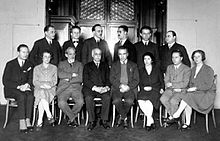Anny Angel-Katan

Photo: Ludwig Gutmann
Anny Angel-Katan (born Annie Rosenberg May 1, 1898 in Vienna , Austria-Hungary ; died December 24, 1992 in Cleveland , Ohio ) was an Austrian-American psychoanalyst .
Life
Annie Rosenberg was a daughter of the pediatrician Ludwig Rosenberg and Judith Rie. Her father and uncles Alfred Rie and Oskar Rie (1863–1931) were close friends of Sigmund Freud and his Tarock partner. Her sister Margarete Krafft (1894–1970) and her cousin Marianne Kris (1900–1980) also became doctors. Annie Rosenberg married the lawyer Otto Angel in 1926, they had their son Klaus Angel (1926–1986), who also became a psychoanalyst. The marriage was divorced in 1928. In 1937 she married the Dutch psychoanalyst Maurits Katan (1897–1977), and in 1939 their daughter Anna Marie was born.
After graduating from high school in 1917, Annie Rosenberg studied medicine in Vienna and received her doctorate in 1923. She received her psychoanalytic training from Max Eitingon in Berlin, from Theodor Reik and from Wilhelm Reich . In 1925 she became a full member of the Vienna Psychoanalytical Association , the subject of her first presentation was Some Observations on a Child . In 1928 Marie Frischauf and Wilhelm Reich founded the “Socialist Society for Sexual Counseling and Sexual Research ” in Vienna . Along with Anny Angel, Edith Buxbaum and others, Annie Reich took over the management of one of the six free sex advice centers for workers.
She completed her training analysis in 1934 with Anna Freud . She specialized in child analysis and took part in courses at the Vienna Psychoanalytic Institute. Annie Angel became a member of the KPÖ , since 1934 the party was banned by the clerical-fascist government . She supported the resistance as the courier of the Revolutionary Socialists . In 1936 she had to emigrate and from 1937 to 1946 she worked as a training analyst at the Psychoanalytic Institute in The Hague . During the German occupation of the Netherlands from 1940 to 1945, she, her husband and her son resisted, and she survived the persecution of the Jews with forged papers.
In 1946 she emigrated with her family to the USA to Cleveland , where she became a member of the Detroit Psychoanalytic Society and in 1957 was one of the founding members of the Cleveland Psychoanalytic Society. She supported the work of the Therapeutic Nursery School (later: Hanna Perkins Center for Child Development.) In Cleveland White House children honored.
In 2016, the Anny-Angel-Katan-Weg was named after her in Vienna's 10th district of Favoriten .
Fonts (selection)
- From the analysis of a bed-wetting woman . In: Zeitschrift für Psychoanalytische Pädagogik, 1934, pp. 216–228.
- Some remarks about optimism . In: International Journal for Psychoanalysis, 1934, pp. 191–199.
- The role of "displacement" in street fear . In: International Journal for Psychoanalysis 1937, pp. 376–392.
- Experience with Enuretics . In: Psychoanalytic Study of the Child 1947, pp. 241-255.
- The nursery school as a diagnostic help to the child guidance clinic . In: Psychoanalytic Study of the Child 1959, pp. 241-255.
- Distortions of the phallic phase . In: Psychoanalytic Study of the Child 1960, pp. 208-214
- Some thoughts about the role of verbalization in early childhood . In: Psychoanalytic Study of the Child 1961, pp. 184-189
- with Robert A. Furman (Ed.): The Therapeutic Nursery School. A Contribution to the Study and Treatment of Emotional Disturbances in Young Children . International Universities Press, New York 1969.
- Children who were raped . In: Psychoanalytic Study of the Child 1973, pp. 208-224
literature
- Elke Mühlleitner: Biographical Lexicon of Psychoanalysis. The members of the Psychological Wednesday Society and the Vienna Psychoanalytical Association 1902–1938 . Tübingen: Edition Diskord, 1992, ISBN 3-89295-557-3 , p. 27f.
- Anny Katan. In: Susanne Blumesberger, Michael Doppelhofer, Gabriele Mauthe: Handbook of Austrian authors of Jewish origin from the 18th to the 20th century. Volume 2: J-R. Edited by the Austrian National Library. Saur, Munich 2002, ISBN 3-598-11545-8 , p. 651 (entry 4974).
- Werner Röder, Herbert A. Strauss : Biographisches Handbuch der Deutschensprachigen Emigration nach 1933 / International Biographical Dictionary of Central European Emigrés 1933-1945 , Vol II, 1 Munich: Saur 1983 ISBN 3-598-10089-2 , p. 598
- Elke Mühlleitner: Angel-Katan, Anny. In: Brigitta Keintzel, Ilse Korotin (ed.): Scientists in and from Austria. Life - work - work. Böhlau, Vienna / Cologne / Weimar 2002, ISBN 3-205-99467-1 , pp. 21-23.
Web links
- Literature by and about Katan, Anny in the bibliographic database WorldCat
- Angel-Katan Anny, b. Rosenberg , at: Univie
- Katan, Anny Rosenberg, MD , at: The Encyclopedia of Cleveland History
- Anny Angel-Katan b. Rosenberg (1898-1992) , at psychoanalytikerinnen.de
Individual evidence
- ^ Lilli Gast: Reich, Annie (1902–1971). In: International Dictionary of Psychoanalysis . Thomson Gale, Detroit 2005.
- ^ Hanna Perkins Center for Child Development
- ↑ Anny Angel-Katan with psychoanalysts. Biographical lexicon
- ^ Mailath: Maria-Lassnig-Straße decided . City hall correspondence of April 8, 2016, accessed April 8, 2016.
| personal data | |
|---|---|
| SURNAME | Angel-Katan, Anny |
| ALTERNATIVE NAMES | Rosenberg, Annie (maiden name) |
| BRIEF DESCRIPTION | Austrian-American psychoanalyst |
| DATE OF BIRTH | May 1, 1898 |
| PLACE OF BIRTH | Vienna , Austria-Hungary |
| DATE OF DEATH | December 24, 1992 |
| Place of death | Cleveland , Ohio |